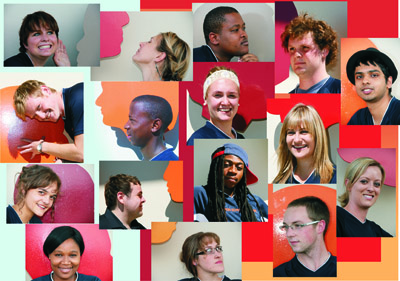Latest News Archive
Please select Category, Year, and then Month to display items
02 January 2025
|
Story Gerda-Marie van Rooyen
|
Photo Supplied
 Leading the research in South Africa is Prof Linus Franke from the Department of Soil, Crop and Climate Sciences.
Leading the research in South Africa is Prof Linus Franke from the Department of Soil, Crop and Climate Sciences.
Scientists are actively pursuing the successful breeding of diploid hybrid potatoes from inbred lines. This is expected to revolutionise potato breeding as it holds the key to rapid genetic progress. It will introduce new varieties for commercialisation through seed. Currently, existing potato variants have a gene that renders self-pollinated seeds infertile.
Prof Linus Franke, an academic in the Department of Soil, Crop and Climate Sciences at the UFS, is leading the research in South Africa. “This technology allows the production of genetically uniform potato seed that is easy to transport and largely disease-free.” He says this differs from conventional breeding whereby only vegetative propagation is possible due to tetraploid varieties in potatoes. It also risks carrying pests and diseases from one generation to the next – leading to the accumulation of pests and diseases with each round of multiplication.
Seed innovation
Prof Franke explains that Solynta BV, a seed company based in the Netherlands that produces potato varieties that can be grown from seed, has included South Africa in their research efforts because it is one of Africa’s largest producers and exporters. Through his academic relationship with Wageningen University and Research, a Dutch institution renowned for its agricultural endeavours and food production, the UFS became involved in researching hybrid potatoes grown from seed.
Diploid seeds containing two sets of chromosomes allow easier gene manipulation to increase predictability and speedier genetic progress. The breeding approach enables the incorporation of tolerance to pests, diseases, abiotic stresses (cold, heat, drought) and other desired genetic traits.
Although Prof Franke is optimistic about this research, he is not blind to disadvantages. “Potato seeds are tiny and have little energy reserves, making it harder to grow potatoes from seed than from tubers.” He says potatoes from seed will take longer to cultivate than tubers, as farmers need to grow plantlets from seeds first, adding six weeks to the growing period. “It is possible that commercial farmers can grow potatoes directly from seed. Alternatively, perhaps more likely, specialised growers will produce tubers of potatoes from seed; these tubers are then sold as seed tubers to other potato farmers, who then continue their normal practices of producing potatoes for the market from tubers.”
Financial benefits
Prof Franke says farmers have reason to get excited. “Seed potatoes will reduce input costs, as varieties with enhanced tolerance to pests and diseases require less pesticides. Planting one hectare of potatoes requires three to four tonnes of potato tubers, but only one 25 g packet of potato seeds.” Since potatoes are a more valuable commodity than maize, this technology might also increase farmers’ income potential.
Odeion School of Music Camerata to perform in Russia
2013-07-31
|
 |
| 31 July 2013 |
OSM CAMERATA "Die Spokewals" by Hendrik Hofmeyr under the baton of Jan Moritz Onken (YouTube)
After a successful audition, the Odeion School of Music Camerata (OSMC) received an invitation to participate in the 13th International Conservatory Festival which will take place in St Petersburg, Russia, from 1 to 9 November 2013. The festival is a yearly highlight on the concert calendar of the prestigious Rimsky Korsakov Conservatoire.
The artistic panel of the festival, under the leadership of Prof Lydia Volchek, annually selects ten international conservatories to gather in St Petersburg for the festival. Some of the participants include the Tchaikovsky Conservatoire: Moscow, Conservatoire de Paris, Eastman School of Music NY and the Sibelius Academy in Helsinki Finland. According to the Rector of the Rimsky Korsakov Conservatoire, Prof Mikhail Gantvarg, it will be the first ever school of music hailing from Africa to participate in the festival.
The OSMC was requested to give two recitals of 40 minutes each during the festival. Maestro Jan Moritz Onken (Chief Conductor of the OSMC for 2013) will lead the ensemble to St Petersburg. OSMC members will have the opportunity to attend all concerts presented by fellow participants as well as masters’ classes presented by the masters of St Petersburg Conservatoire.
The festival is usually opened and closed with a grand concert presented by the St Petersburg Conservatoire Symphony Orchestra (70 plus members). Last year the opening concert was conducted by the celebrated master, Valery Gergiev (artistic director of the Mariinsky Opera and Symphony Orchestra), while the closing ceremony was conducted by Semyon Bychkov – reciting the Leningrad Symphony by Shostakovich. Both Gergiev and Bychkov are alumni of the St Petersburg Conservatoire.
All recitals at the festival will be presented in the Opera and Theatre Hall of the Conservatoire, as well as in the acclaimed Glazunov Concert Hall located within the colossal conservatory building.
The OSMC will recite a programme of mainly South African composers, with two new works commissioned by the OSM New Music Initiative. These were written by the prolific South African composer, Hendrik Hofmeyr: laureate of the Queen Elizabeth International Composition Competition, entitled Spokewals / Phantom Waltz and Notturno Elegiaco. Spokewals / Phantom Waltz is a challenging work where musicians simultaneously play, sing and speak.
A reworked edition for chamber orchestra of the original string quartet for piano and soprano, Liedere op Boesman-verse, by revered South African composer, Stefans Grové, will also be performed. To commemorate the centenary of composer Benjamin Britten this year, Cantus in Memoriam of Benjamin Britten by Arvo Pärt is also included in the programme.
After participating at the festival in St Petersburg, the ensemble will depart for a two-day visit to Moscow where the OSMC will perform an ’All South African’ programme.